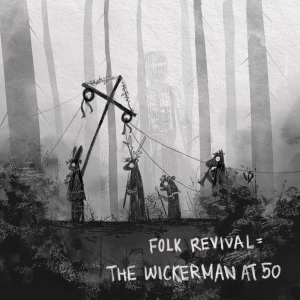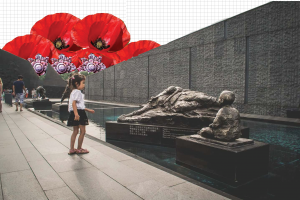
Superficial societies in transgressive fiction
by Oliver Jones-Lyons | July 23, 2022
Transgressive fiction isn’t well known for its depictions of decadence. The genre is defined by its focus on behaviour outside accepted moral norms, ranging from sexual impropriety and violence to extreme drug use and addiction. Transgressive fiction arranges elements of different genres, such as horror, thriller or even at times comedy, around the morally questionable behaviour of its protagonists. However, in genre-defining books and films like American Psycho and Fight Club, the narratives are often built around a jarring contrast between the destructive forces of transgression by the protagonists and the more authoritative, visible materialism and conformity of the middle and upper-class society that surrounds them. Decadence is often used as a theme to project a sense of social authority derived from economic security. Both American Psycho and Fight Club trace how decadence itself has become a transgressive force in today’s society.
Decadence is a pivotal part of the settings of both stories. The narrative of Fight Club is sparked by the destruction of The Narrator’s ‘IKEA Lifestyle,’ where he has spent his entire career focused on the purchase of new items of furniture to fit a certain aesthetic. In a sense, this is the pursuit of a ‘common decadence,’ an outward but entirely self-indulgent display of not necessarily extreme wealth but economic security. This type of furniture is made cheaply and ready to discard when the next interior design trend comes along. The ‘IKEA Lifestyle’ is a purely outward display of a fashion sense dictated by others; the crafting of this lifestyle is in a sense an act of ‘keeping up appearances.’ The Narrator’s entire sense of security and personal comfort arises out of his lifestyle choices, his ‘common decadence,’ and, with its destruction, his transformation into his transgressive anti-hero alter ego Tyler Durden becomes inevitable.
Decadence is a key theme in the main plot line of American Psycho, that being the murder of Paul Allen. There are frequent references to Dorsia, a fictional restaurant, a setting that the audience never sees. It is the epitome of the self-indulgent wining and dining culture that is key to the text, where the social status of an individual is defined by their ability to get a reservation. Paul Allen frequently discusses his successful bookings there causing character-defining bouts of extreme jealousy in Patrick Bateman who is unable to secure a booking. This jealousy of a peer who has reached the peak of this hierarchy of outward gluttony culminates in Bateman murdering Allen, declaring it as his motivation with the now-famous line: “try getting a reservation at Dorsia now, you fucking stupid bastard.”
Outward displays of decadence are inherently hypocritical. One of the most recognisable features of transgressive fiction is its exposure of the hypocrisy integral to the societal norms that it explores, through the reaction it evokes. For example, in Fight Club, audiences are naturally disgusted when The Narrator shows his bloodied mouth during a business presentation, yet when the Paper Street Soap Company presents their soap created with the waste fat from liposuction procedures, it is considered the very best product the beauty store has on offer. This is yet another example of how superficial our standards, consumed by the need for outward displays of economic security, have become. Whilst we react with utter disgust to the display of a bloodied mouth by the Narrator, one can already imagine how audiences across the western world will have gone straight to Google after hearing Tyler Durden’s explanation of how good human fat was for soap. This specific taboo has also been explored by the artist Julian Hetzel in his Schuldfabrik exhibit. The installation consisted of a pop-up shop, which sold bars of soap made from the by-products of liposuction that raised money for water sanitation in the developing world. It explored the relationship between our excessive beauty culture and our guilt (Schuld can be translated as guilt or debt) over rampant global inequality. This hypocrisy is a core theme of Fight Club; one of Tyler Durden’s first anti-consumption rants focuses on how The Narrator doesn’t need the things he has acquired in a “hunter-gatherer way.” Whilst they aren’t needed for survival in the literal sense, the standards crafted for society by the advertising industry have created a need to acquire and consume for “social survival.”
The basis for the social hierarchy found in American Psycho feels like a front. When David Van Patten declares that he’s “not hungry but [would] like to have a reservation somewhere,” it is made explicit that the social hierarchy of wining and dining is a facade. We never see any of the characters who work for Pierce and Pierce actually working. We see Bateman fake a work call, and the famous business card scene seems to precede some form of meeting, so there is a suggestion that some form of work takes place, but for the most part the characters participate in social occasions only. In the book, we do see the characters ‘at work’ but this seems to consist of meeting with clients in the same settings as the social encounters; the line between work and leisure seems non-existent. This hypocrisy makes the audience more disgusted with Patrick Bateman. Take the murder of homeless man Al as an example. Bateman tells Al to “get a goddamn job,” an instruction that seems hypocritical in the face of Bateman’s distinct lack of work throughout the text, yet to preserve his self-image after being touched by Al, whom he regards with pure disgust, he brutally murders him. The entire idea of decadence seems to further a potent and distasteful system of hypocrisy. Far from indulgence being the just reward of a meritocracy, decadence stands as the unearned fruit of other people’s labour which seems to justify the extreme brutality and destruction of transgressive figures such as those in Tyler Durden’s Project Mayhem.
Decadence is ultimately an appeal to conformity to the ideals of middle- and upper-class society. Patrick Bateman tells his wife, Evelyn, that he wants nothing more than to “fit in.” The opening scene demonstrates the universality of this across society as we listen to a string of waiters with almost identical delivery of the menu items in one of the many fictional New York restaurants that form the setting of the film. Whilst the film is based in the late 80s, it was released in 2000 and this staging of conformist thinking is by no means accidental. Fashion and lifestyle trends in the early 21st century were equally conformist with the boom of Y2K fashion, so the social pressure to fit in would by no means have been alien to the audience, just as it is not alien to us. The viewer is warned, through the character of Patrick Bateman, of the psychological damage that comes with erasing individual identity – emphasised even more so by black-tie dress codes and unspoken expectations. Perhaps society is beyond the strict conformity that American Psycho is so critical of, but it is harder to argue that we have moved past the ‘IKEA Lifestyle’ of The Narrator in Fight Club. It is easy for the average person to dismiss Patrick Bateman’s extreme pull to conformism, but that ignores just how easily most people comply with the similarly decadent social norms of middle society. We may find Bateman’s reactions extreme and even darkly comedic, but is this not in a sense hypocritical?
Finally, decadence is fundamentally a matter of aesthetics in these texts. The aesthetically beautiful exists in these texts only to contrast with the grime and dirt associated with lower social classes. American Psycho is infamous for the allegations of misogyny levelled against it, due to its extreme violence towards women and characters who make openly sexist remarks. Brett Easton Ellis, American Psycho’s author, claims that this fundamentally misunderstands the text and it instead functions as a critique of masculinity. The low worth the male characters assign to the beautiful women in their life seems wasteful of their value. The women in this text are also more than just their appearances; they often talk of their impressive educations or jobs, further exemplifying the wasteful and superficial nature of the male gaze. Commentary on transgressive fiction typically understands the male gaze as an obsessive and objectifying force, but it can also be viewed as facilitating overindulgence. The men in this text have great beauty practically on-demand, often in excess, and instead of providing any real sense of appreciation for it, the characters simply apply their overindulgent attitudes to people as well as objects. The men partake in affairs and mercilessly cause emotional pain to their significant others, the beauty of these women is entirely disregarded and taken as a given; female characters in the text exist solely to be consumed by the men in their lives. Bateman and his social circle’s lack of appreciation for beauty and aesthetics seems to be central to decadence and forms a significant contrast with the destructive forces of transgression and degeneracy. In Fight Club, The Narrator briefly explodes into a bout of extreme anger and violence against Angel Face, a man remarkable only for his beautiful appearance as a “pretty boy.” After this bout of anger, The Narrator is asked by his alter-ego why it happened, and he responds by saying that he simply wanted to “destroy something beautiful.” Even in this brutal, middle-class breakout violence from the narrator, there seems to be a higher appreciation of beauty than the indulgent upper classes, depicted in American Psycho, seem capable of. Destruction seems to be more righteous than indulgence on an aesthetic level.
Modern decadence, as presented in transgressive fiction, has become defined by its hypocrisy, appeal to conformity and underappreciation of beauty. When contrasted with destructive behaviour, our instincts seem to prefer destruction. This liberation from the daily mundane effort to maintain superficial social norms is just one reason why many people like transgressive fiction. It is also why it is enjoying a resurgence as we see the consequences of consumerism gone wrong after the burst of the dot com bubble and the 2008 financial crisis, the growing abdication of collective social responsibility and a society that by its desire for individualism has created conformity in its illusion of self-expression. Transgressive fiction mirrors the moral underbelly of society: it offers in its bleak reflection a call to arms for societal redemption, but readers must be careful not to create nihilistic idols out of its characters and unintentionally create further social decay.∎
Words by Oliver Jones-Lyons. Art by Rachel Jung.
![‘Fiction’s about what it is to be a fucking human being’ [David Foster Wallace]. Is it? 6970074272_f580c22601_o](https://isismagazine.org.uk/wp-content/uploads/2015/03/6970074272_f580c22601_o-227x300.jpg)



